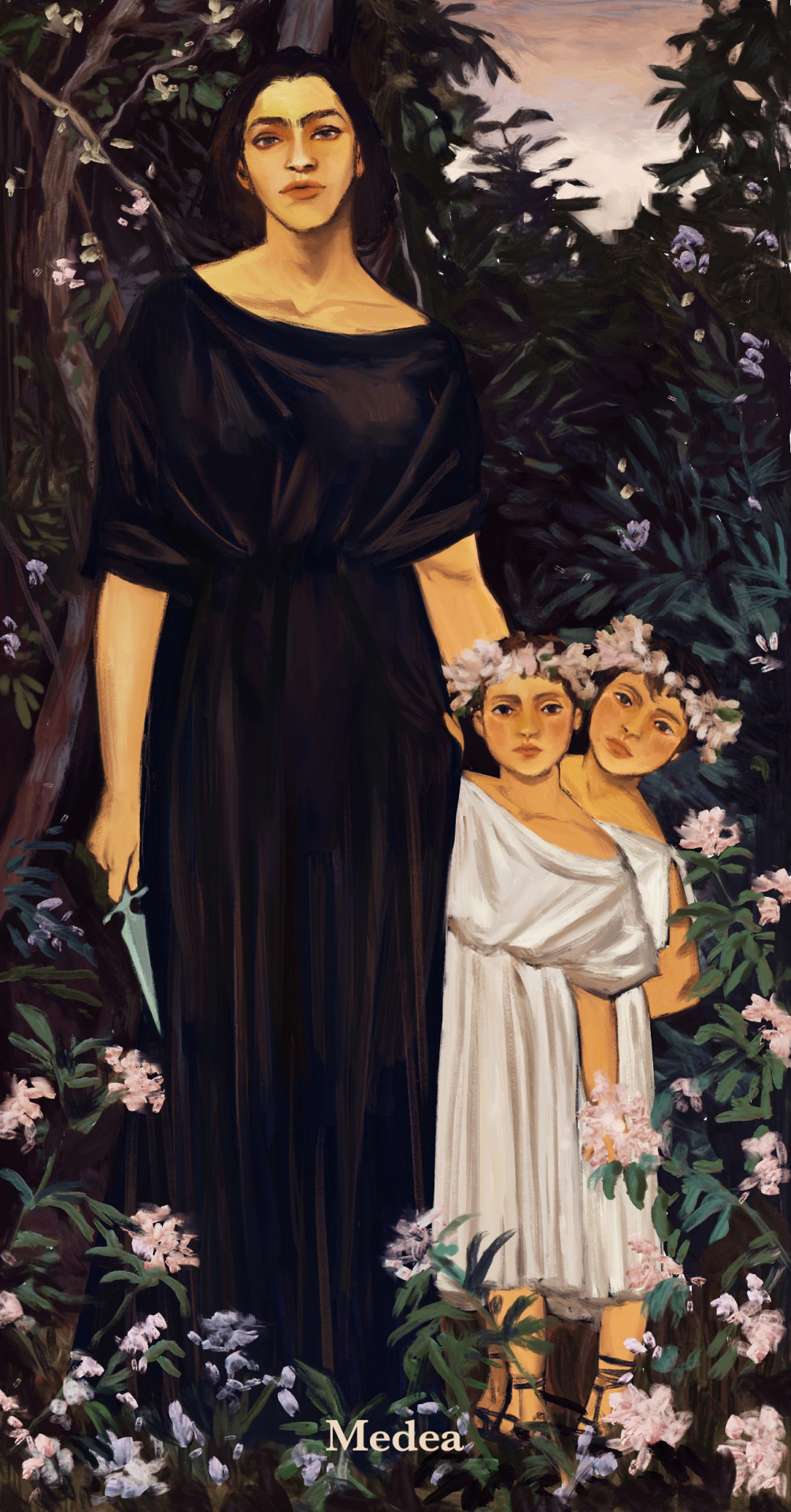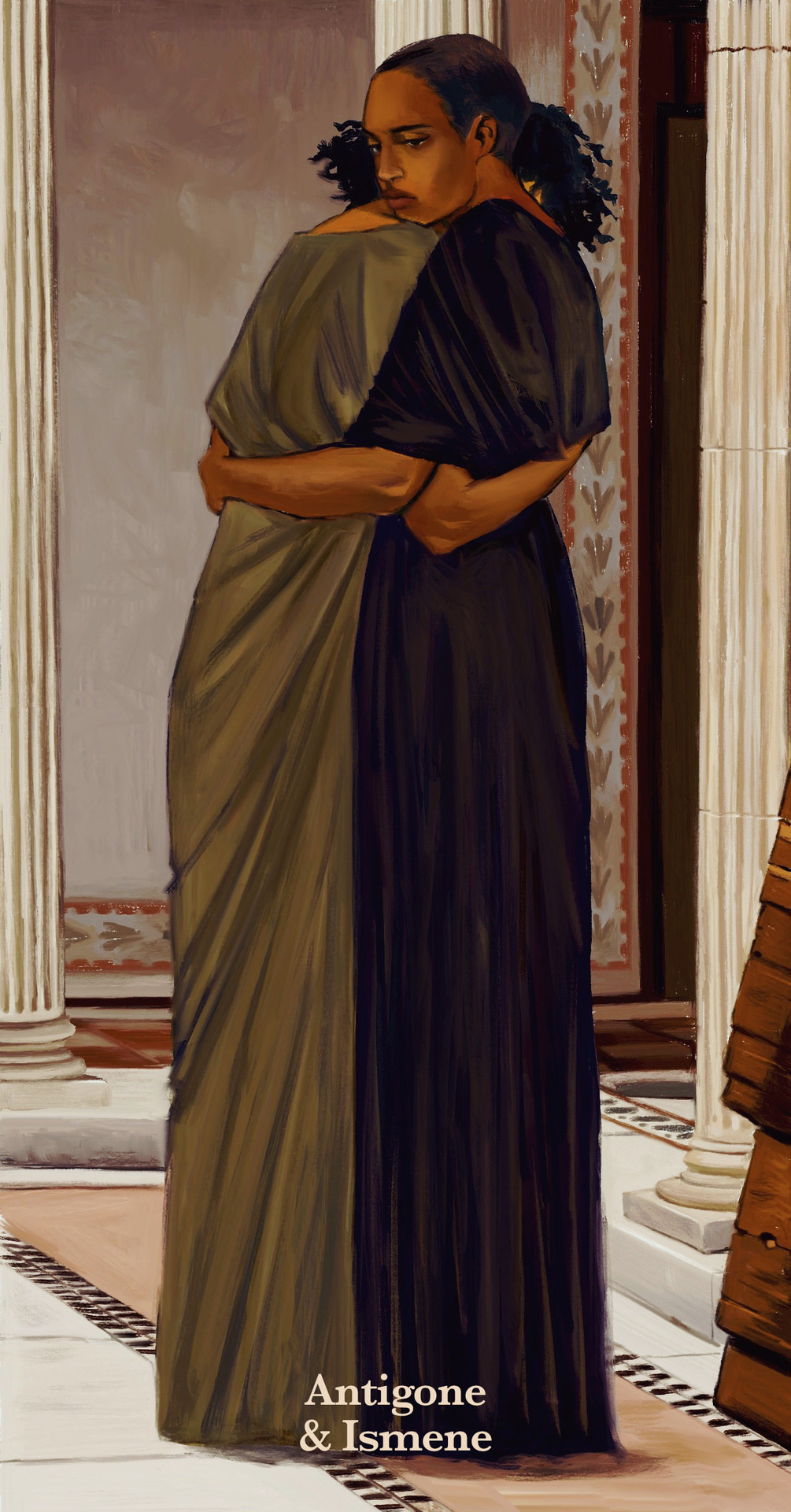Photo

“Orpheus, my heart is yours Always was and will be It’s my gut I can’t ignore Orpheus, I’m hungry”
6K notes
·
View notes
Photo






Women in Greek Tragedy
ig / twitter / shop
92K notes
·
View notes
Text
tips for improving reading comprehension / cutting through brain fog / dealing with a language processing disorder
aka I tried paying attention to what I do when reading a text & here’s what I came up with
make sure you know what pronouns, & other terms that are in reference to something else, are referring to. look earlier in the sentence or paragraph to find the referents of words like “it,” “that,” “these,” “which,” “they,” etc. insert the referent back into the sentence if you need to.
pay special attention to words that explain relationships between things, facts, or ideas. words and phrases such as “similarly,” “however,” “although,” “still,” “in contrast,” “despite,” etc. will help you understand how a writer wants a proposition to be evaluated in relation to something that’s already been stated–as evidence, as a counterpoint, as something in tension or in accordance with something else, etc.
map things out spatially. things being contrasted are further apart from each other in your mental space, one thing that leads to or causes another is an arrow pointing in a given direction, something that’s a subgroup of something else is a circle within a circle, and so on. your system may be similar to or different than this.
if a parenthetical aside breaks up a sentence and you can’t pick the thread of it back up, try reading and understanding the sentence up through the aside, then removing the aside and just reading the first and second parts of the sentence as if there were no interruption.
once you think you’ve understood the general idea of what a sentence, paragraph, or essay is about, go back and read it again, keeping the main point in mind, and ask yourself how everything you read contributes to that point. if you’re having trouble with certain parts of a text, this will probably help you pick up more detail the second time around.
if you’re having trouble processing a clause, try forging ahead and finishing the sentence–you may have been parsing something incorrectly based on incomplete information, & the remaining bit of the sentence could clear that up.
keep track of any confusion or questions that you have as you read and see if they’re resolved or answered later in the text.
read a difficult sentence aloud if you’re having trouble parsing it–forcing yourself to take note of the prosodic contours of a sentence may help you with its syntax, since prosodic cues such as pauses and rising or falling intonation often correspond with syntactic boundaries.
restructure sentences or space them out differently, either mentally or using word processing software, in whatever way makes it easier for you to understand them (e.g. breaking longer sentences up or combining shorter sentences, making parentheticals into their own sentences, etc.)
take a break. if you’ve been reading for a while you might be too tired or frustrated to make sense of something, or you may be too determined to parse a sentence (especially a syntactically or semantically ambiguous one) in a way that doesn’t make sense. come back when you have a clearer mind.
2K notes
·
View notes
Text
So I found this cool website for learning ancient languages
go wild
306K notes
·
View notes
Photo

Classical Language Learning Masterpost
I’m not studying any Greek or Roman this coming year (I sacrificed intro classical languages for gender & history), but I will be doing a Roman history module and engaging with the language is always useful. I know a few people who have been looking for Greek/Latin learning resources, which is how this list came about. It includes MOOCs, youtube videos and websites. Not really knowing much Latin or Greek I can’t vouch for them 100% but my googling skills are pretty on point, so they should be okay. Feel free to correct me or add to this.
Latin
Getting started on classical Latin
Duration 10 hours
Introductory level
This free course, Getting started on classical Latin, has been developed in response to requests from learners who had had no contact with Latin before and who felt they would like to spend a little time preparing for the kind of learning that studying a classical language involves. The course will give you a taster of what is involved in the very early stages of learning Latin and will offer you the opportunity to put in some early practice.
Continuing classical Latin
Duration 4 hours
Intermediate level
This free course, Continuing classical Latin, gives you the opportunity to hear a discussion of the development of the Latin language.
FLVS Latin
As we build our Via Latina, we will travel back to ancient Rome. On our travels we learn about their culture, history and literature.
National Archives: Beginner’s Latin
Welcome to the beginners’ Latin tutorials. These lessons cover the type of Latin used in official documents written in England between 1086 and 1733. This can be quite different from classical Latin, as used by the Ancient Romans.
Learn Latin
Here are two dozen short lessons on learning Latin designed for “mountain men” (and women: montani montanaeque), engineers, philosophers, and anyone else looking for entertainment and with lots of free time by the campfire. My course is quite different from Peter Jones’ Learn Latin (New York: Barnes and Noble, 1997), but it is just as devoted to interesting you in Latin.
Learn Latin (Learn101)
I would like to welcome you to the Latin lessons. I’m here to help you learn Latin, by going step by step. All the lessons contain audio and are all offered for free.
The London Latin Course
170 videos
Learn Latin from the ground up. This is a serial course, structured to bring you to a high level of Latin fluency. The pace is slow and unhurried. This course is suitable for all ability levels. Restored Classical Pronunciation.
Latin Online
Latin is probably the easiest of the older languages for speakers of English to learn, both because of their earlier relationship and because of the long use of Latin as the language of educational, ecclesiastical, legal and political affairs in western culture.
Latin Excercises
Welcome to UVic’s practice exercises for Wheelock’s Latin (6th edition). There are 40 units comprising many hundreds of exercises to help you consolidate your progress in the classroom and with the textbook.
Ancient Greek
Introducing Ancient Greek
If you are starting to learn Ancient Greek, this site is for you! This site will help you prepare for a Beginner’s Ancient Greek course.
Classical Greek Online
Greek has been important in the intellectual life of western civilization, but not to the extent of Latin except for ecclesiastical matters. In years past, Latin was introduced in the first year of High School, followed by Greek in the third year.
Ancient Greek Online
This site was designed to be a learning environment for students as well as a reading room for scholars. The large print Greek is easy on the eyes. The Internet has returned us to the scrolling method of reading texts, which lends itself particularly well to the project at hand.
Teach Yourself Ancient Greek
The material presented here will be of use to anyone beginning ancient Greek, but is specifically designed to accompany our book.
Ancient Greek Grammar
103 videos
Including pronunciation tips. I haven’t personally watched this and there’s no real description, but it looks pretty comprehensive from what I can see.
Greek & Latin
Introducing the Classical world
Duration 20 hours
Intermediate level
How do we learn about the world of the ancient Romans and Greeks? This free course, Introducing the Classical world, will provide you with an insight into the Classical world by introducing you to the various sources of information used by scholars to draw together an image of this fascinating period of history.
Discovering Ancient Greek and Latin
Duration 12 hours
Intermediate level
The free course, Discovering Ancient Greek and Latin, gives a taste of what it is like to learn two ancient languages. It is for those who have encountered the classical world through translations of Greek and Latin texts and wish to know more about the languages in which these works were composed.
Textkit
Textkit began in late 2001 as a project to develop free of charge downloads of Greek and Latin grammars, readers and answer keys. We offer a large library of over 180 of the very best Greek and Latin textbooks.
11K notes
·
View notes
Text
anyway, i don’t believe in nor am i good at self promotion but read my iliad AU in which achilles kills agamemnon plz
82 notes
·
View notes
Photo




for @melqomene and @arthemis mythological event — 1st day: favourite greco/roman deity/group/creature » Circe
“Then we came to the island of Aeaea; here Circe dwelt, a goddess with braided hair, with human speech and with strange powers; the magician Aeetes was her brother, and both were radiant Helios the sun-god’s children; their mother was Perse, Oceanus’ daughter.”
1K notes
·
View notes
Text
ancient greek word of the day: δρυμόνιος , -α, -ον, (drumonios, -a, -on) haunting the woods, epith. of Artemis
1K notes
·
View notes
Text
Agamemnon: If she breathes, she a thot
Achilles: ALL WOMEN ARE QUEENS SON OF ATRIUS
2 notes
·
View notes
Photo








Greek Mythology | The Lovers Part 1 & 2
prints!!
i’m actually proud of these!! so far i’ve done greek mythology goddesses and lovers… i want to continue this series so let me know if you have any suggestions of what to do next!
89K notes
·
View notes
Text
You’re an ancient Greek man coming home from 4 months of war to find your wife 3 months pregnant. Now you’ve embarked on a solemn quest: to punch Zeus in the face.
227K notes
·
View notes
Text
Space Theoi
Zeus is gravity– unseeable, unknowable, defying human understanding. He holds the planets in place. He slingshots rockets back home. He cradles Earth in a steady orbit and tells them that they are safe.
Hera rests on the rings around Saturn. She drapes herself across their icy surface, riding their steady rotations, ever-watching, ever-awake.
Artemis holds the moon in her hands. Some call her goddess of the moon, but she knows that she is but a friend to Selene. She watches in awe as Selene glows, and she tries to bring that peace back to the forest with her.
Apollo lights up his sister’s hands as he rests upon the Sun. He surrounds himself with light, and he tries to find music in between the sunspots and the harsh solar winds. When he can’t find any music, he makes it for himself.
Hestia kindles the flames of the stars. She watches them grow up, and she mourns at their supernovas. She paints Earth’s skies with constellations, and she tries to keep the world aglow despite their dying light.
Poseidon takes pleasure in placing water in places where no one dares to look. He crafts great oceans in distant planets, at the center of unexplored moons. He knows that life is sacred, even if it is unknown.
Ares hurls meteors across distant skies. Asteroids are his cannonballs. Comets are his bullets.
Aphrodite watches in awe as Ares’ ammunition glides through the atmosphere. She sets them aglow and calls them shooting stars. She listens to the faraway wishes, but she can’t grant them all.
Athena plants ideas in the minds of faraway astronomers and cosmologists. She whispers of string theory, of the multiverse, of membranes, of dimensions. She smiles as ideas become theories and theories become facts.
Dionysus sends out constant reminders that the universe can never make sense. He muddles Athena’s great ideas and reminds us that the world doesn’t have meaning– it just is.
Demeter grows galaxies as if they are crops. She names them as if they are her children, “Sunflower”, “Andromeda”, “Tadpole”, and she nurtures them from seeds, waiting for the day that they will be ready for harvest.
Hephaestus sculpts quarks into atoms, atoms into elements, elements into entire nebulas. He knows that the other deities rely on him to make the universe work, but they seem to forget.
Hermes is the speed of light. He knows that he can’t be matched, can’t be broken, can’t ever be surpassed. He is infinite.
Hades sleeps at the center of blackholes. He pities those who quiver at the chaos, the terror, the horrible uncertainty of his gaping cracks in space; he knows that there is nothing to fear about darkness.
4K notes
·
View notes




